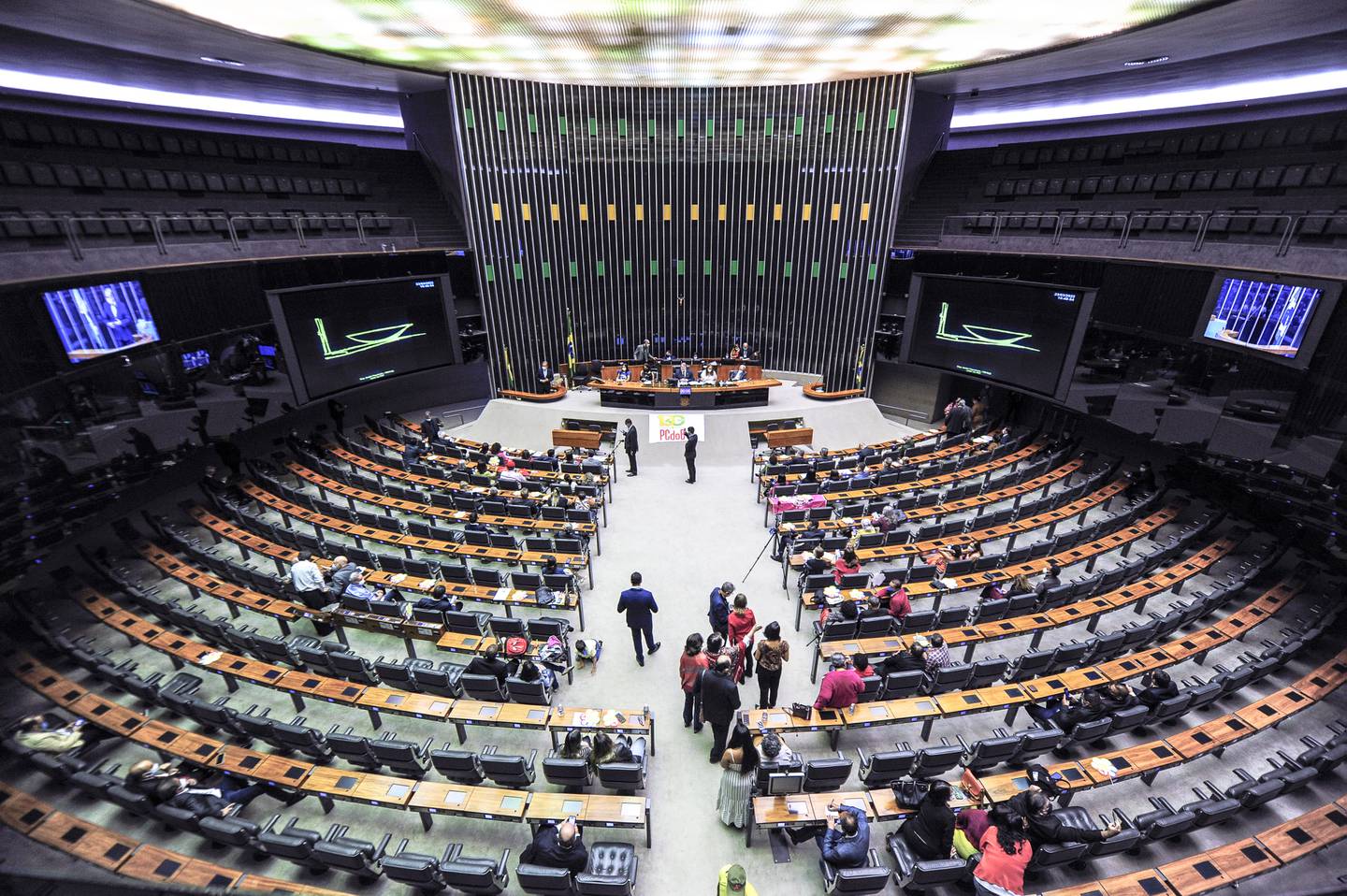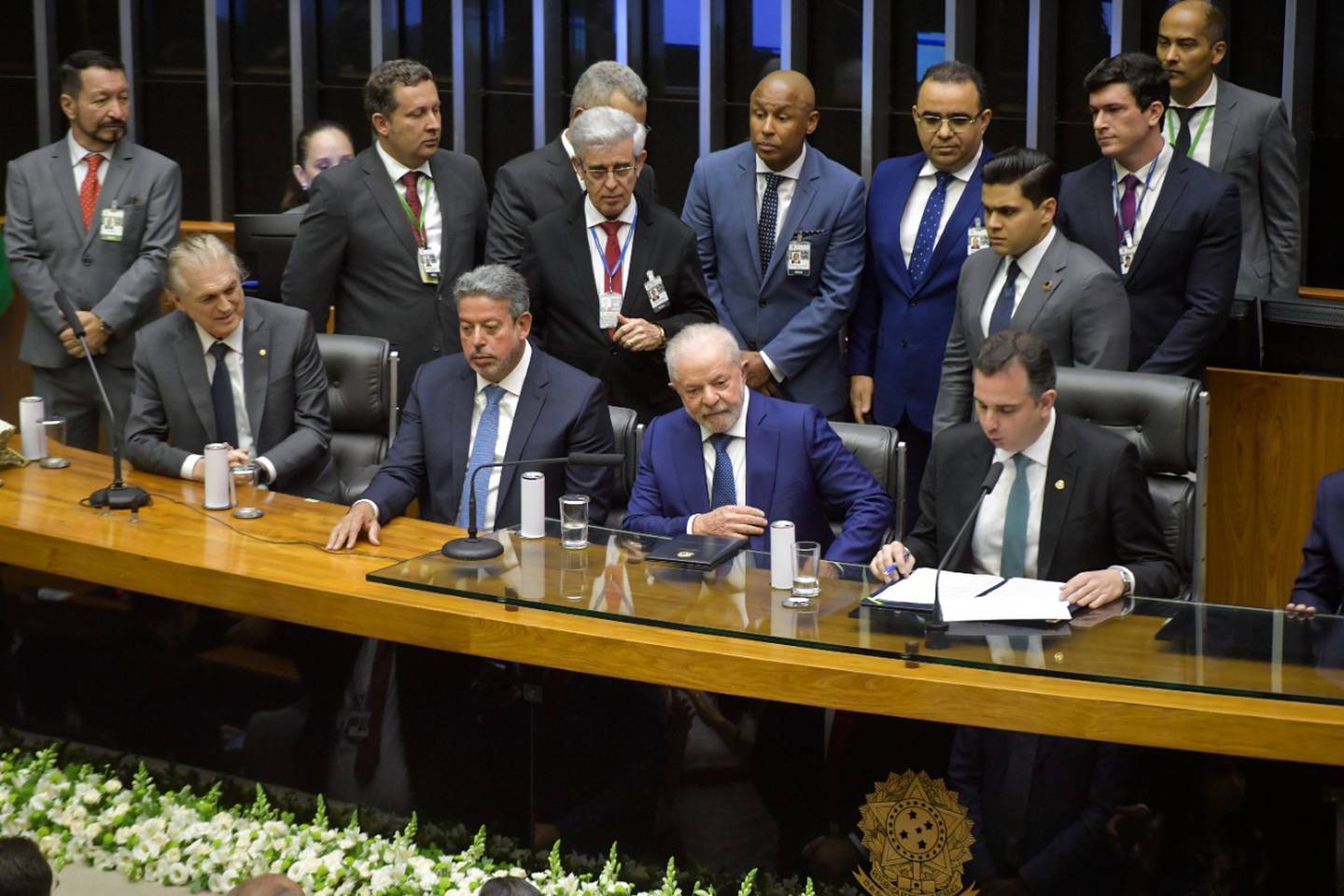Seven of the ten most influential parliamentarians of the last legislature are from the so-called Centrão.
Of the other three, none is from the Workers’ Party, and only one is from the left.
The resumption of activities in Brazil’s Congress, with the ceremony for parliamentarians elected this Wednesday (Feb. 1), kicks off negotiations around what is the most valued currency in Brasília: influence.

The appointment of parliamentarians to strategic positions in commissions defines the importance of each one in reaching agreements between parties, the government, and other politicians to vote on important projects, such as tax reform.
For President Luiz Inácio Lula da Silva, this definition is fundamental for approving projects of interest to the elected government.
According to the Observatory of the Brazilian Legislative Power (OLB), the ten most influential congressmen in the legislature that is ending are the Speaker of the House Arthur Lira, Elmar Nascimento, Felipe Fracischini, Rodrigo Maia, Antonio Brito, Ricardo Barros, Altineu Cortes, Arthur Maia, André Figueiredo, and Kim Kataguiri.
These congressmen will likely continue to play an important role in the new legislature.
Of the ten, only Rodrigo Maia, who did not run for reelection, will not be present in the House in 2023.
According to the OLB – a political science study center linked to UERJ (State University of Rio de Janeiro) – a parliamentarian’s influence is measured by the positions he or she holds in the Chamber and the bills for which he or she is the rapporteur during his or her term of office.
Thus, the OLB calculates an index of parliamentary influence to indicate who are the main members of the Chamber.
The results are contained in the article “Do the most influential members of the Chamber act positively or negatively towards the environment?” by researchers Joyce Luz, João Feres Jr, Júlio Canello, and Maiane Bittencourt.
The “influence index” is calculated based on the attributions of degrees to the positions held by parliamentarians.
The higher the “weight” of the position or the speaker, the higher the score.
THE POWER OF THE “CENTRÃO”
The research results show the great influence of the so-called “Centrão” parliamentarians – a group of parties with no defined ideological orientation and only aim to ensure proximity to the executive branch – tends to remain a relevant force within the Chamber during the Lula government.
Among the ten most influential parliamentarians, seven are from “Centrão”.
The others are former Speaker Rodrigo Maia, Antônio Brito, and André Figueiredo.
The Centrão, in OLB’s description, is a “group of parliamentarians recognized for supporting the government in exchange for benefits.”
It was this group of parties that supported the government of Jair Bolsonaro.
“The parties that most supported President Jair Bolsonaro’s (PL) administration in the Chamber are precisely those with the most influential parliamentarians,” the study says.
OLB researcher Joyce Luz, a doctoral candidate in Political Science at the University of São Paulo and one of the authors of the study, told Bloomberg Línea that influence is more linked to the size of the bench than to the party’s support for the government
“The grassroots parties are usually in the most important committees, but because they are the largest benches, and not just because they support the president,” she said.
If this hypothesis is correct, the size of the benches tends to be another obstacle for Lula’s government.
According to a collection of the Intersyndical Department of Parliamentary Accompaniment (Diap), Bolsonaro’s party elected the largest bench in 2022.
They elected 99 parliamentarians, which is an increase of 23 seats compared to what the party had before. The data considers the period when parliamentarians can change parties without losing their mandate due to infidelity.
The federation led by the Workers’ Party (PT) had the second largest bench: 80 parliamentarians, 11 more than in May 2022, the same after that period.
In third, fourth, and fifth place were the “Centrão” parties. This means that the group has almost 250 parliamentarians.
In any case, Diap’s conclusion regarding the elected parties is that the “new Congress will be more right-wing, conservative in the customs agenda and neoliberal in the economic one, which understands that the role of the State should be minimal in this front”.
The opposite, therefore, of what Lula advocates.
AGREEMENTS WITH THE PT
With the size of the “Centrão” bench and the size of the influence of its parliamentarians, the PT had to negotiate with Arthur Lira.
Instead of launching its own candidate for the presidency of the Chamber for the next biennium, President Lula’s party will support the parliamentarian’s reelection.
In exchange, Lira offered the PT priority in the election of the presidencies of the main committees.
The most important one, the Constitution and Justice and Citizenship Commission (CCJ) will be led by congressman Rui Falcão this year and then to a parliamentarian appointed by the “Centrão” party, according to a source linked to the PT told Bloomberg Línea.
The commission is the most important in the Chamber.
All bills go through it, and the collegiate evaluates whether the wording conforms to the constitutional rules of legislative drafting (there is no merit analysis, which the Senate’s CCJ only does).
Staying with the PT will be a relief for the government in the first year.
After that, however, “the CCJ may become a problem for the government,” said Joyce Luz.
If the commission remains with a party that “does not tune in” to the government’s agendas, it could function, in practice, as “a last veto to grassroots projects,” says the researcher.
Falcão was president of the PT between 2011 and 2017. He is part of an internal group within the party that opposes Lula’s group.
Instead, the PT leadership in the House, responsible for guiding the party’s behavior in the House, remained with Zeca Dirceu, son of former Minister of the Civil House José Dirceu.
LIRA’S INFLUENCE
Considered the most influential congressman of the administration that is closing, the president of the Chamber, Arthur Lira, is an exponent of the “Centrão” and was already the leader of his party in the Chamber.
The reasons for leading the list of the most influential are obvious: the president of the Chamber leads the agenda and the Steering Committee.
For example, he chooses which bills will be voted on the agenda, who will be the rapporteur of the texts, who will chair the committees, install special committees, and receive nominations from the leadership for these groups.
“He has the power to do and undo things within the House,” says political scientist Joyce Luz.

Before becoming commander of the House, Lira was president of the Constitution and Justice Committee (CCJ), the only committee through which all bills pass, and of the Joint Budget Committee, which prepares the Union Budget and is composed of parliamentarians and senators.
For the OLB, “since he assumed the presidency of the Chamber in 2021, Lira has strategically used the prerogatives of his position to influence not only the legislative agenda but also important votes.”
After Lira comes congressman Elmar Nascimento.
He reiterated his influence by being elected leader of the party in the Chamber and rapporteur of the Transition Pact, the most important proposal of the Lula government so far.
However, it was discussed and elaborated on before the ceremony.
This was the text that made room for the release of R$168 billion (US$33.1 billion) above the spending limit so that the current government could pay its relief program, the “Bolsa Familia” with a monthly value of R$600, readjust the minimum wage and recompose budgets of the ministries, which the Bolsonaro government had cut.
As rapporteur of the text, Elmar Nascimento, who was reelected, once again became an important player in Congress, even though he is from a party in opposition to the government – at least in theory, since the party has three ministers in Lula’s government.
RENEWAL RATE
One of the study’s conclusions is that holding office in the House can bring benefits at the polls.
According to the document, the “rate of influence” of the parliamentarians re-elected in October 2022 was double that of those not re-elected.
“There comes a time at which that difference suggests to us that holding positions of power in the Chamber brings an electoral return,” the study notes.
It may also indicate what Lula’s government will face in Congress.
According to the Inter-Union Department of Parliamentary Monitoring (Diap), 64.12% of the candidates for reelection achieved a new mandate in the Chamber.
This indicates a renewal rate of 44.24% of the parliamentarians.
According to the entity, this is a return to figures close to the historical average of 45% renewal, which had risen in 2014 and 2018.
But it is a renewal that “can be considered relative because there was the phenomenon of circulation in power with the entry or return of former federal and state parliamentarians, senators, as well as governors and mayors known in the political world,” Diap analyzed.
With information from Bloomberg

